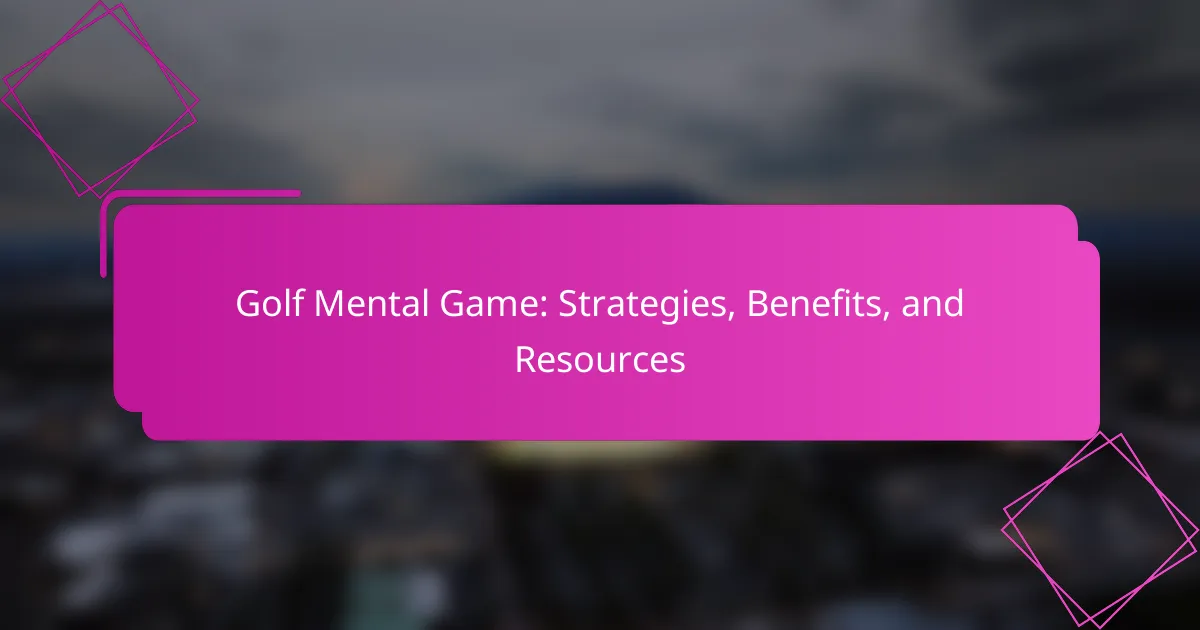Mastering the mental game of golf can significantly enhance focus, reduce anxiety, and improve overall performance. Key strategies include visualization, mindfulness, and developing a consistent routine. Cultural attitudes also shape mental approaches, influencing resilience and confidence. Various resources, such as sports psychology books and mindfulness apps, can further support golfers in strengthening their mental game.
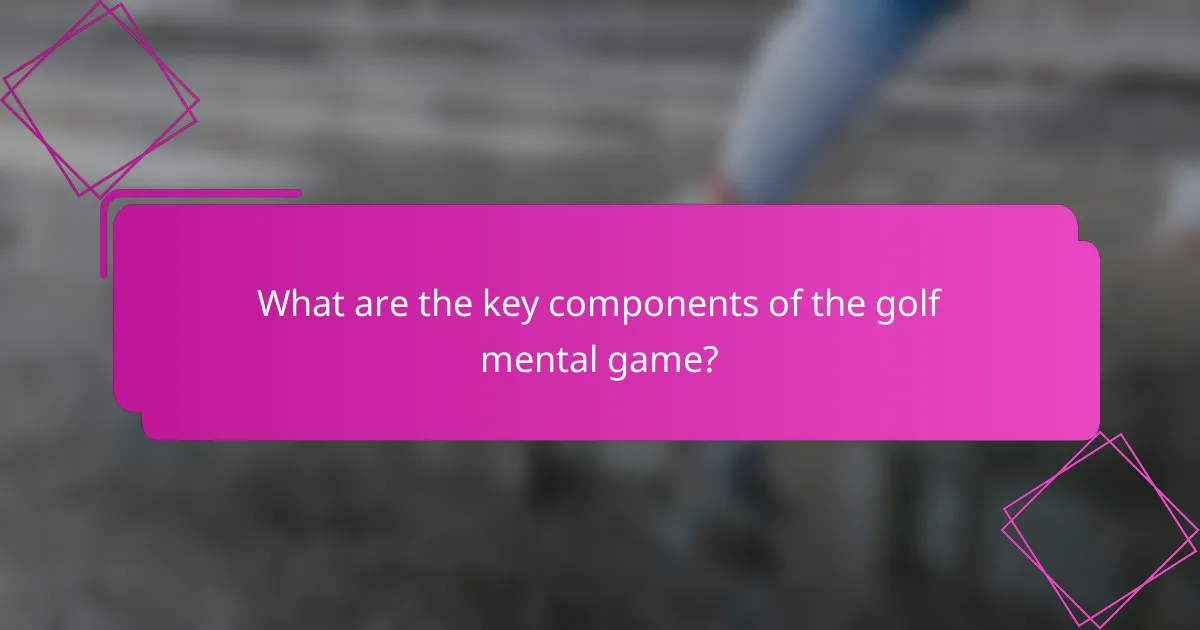
What are the key components of the golf mental game?
The key components of the golf mental game include focus, confidence, emotional control, and routine. These strategies enhance performance by fostering a strong mindset.
Focus allows players to concentrate on the present shot, minimizing distractions. Confidence builds belief in one’s abilities, crucial for tackling challenging situations. Emotional control helps manage stress and frustration, maintaining composure. A consistent routine provides structure and familiarity, reducing anxiety during play.
These components collectively contribute to improved performance on the course, making the mental game an essential aspect of golf.
How does mental toughness influence performance?
Mental toughness significantly enhances performance in golf by improving focus, resilience, and emotional control. It allows players to maintain composure under pressure, leading to better decision-making and shot execution. Studies show that mentally tough golfers often outperform their less resilient peers, particularly in high-stakes situations. Developing mental toughness involves strategies such as visualization, positive self-talk, and mindfulness, which can all contribute to a stronger mental game.
Why is focus essential during a golf round?
Focus is essential during a golf round because it enhances performance and decision-making. Maintaining concentration allows golfers to manage their emotions, reduce distractions, and execute their strategies effectively. A strong mental game leads to improved consistency and confidence on the course. Studies show that focused players often achieve lower scores, demonstrating the direct correlation between mental focus and golfing success.
What role does emotional regulation play in golf?
Emotional regulation significantly enhances a golfer’s performance by managing stress and maintaining focus. It helps athletes cope with pressure and recover from setbacks during a game. Effective emotional regulation strategies, such as mindfulness and visualization, contribute to improved concentration and decision-making. By fostering a positive mindset, golfers can better navigate challenges on the course, leading to more consistent performance.
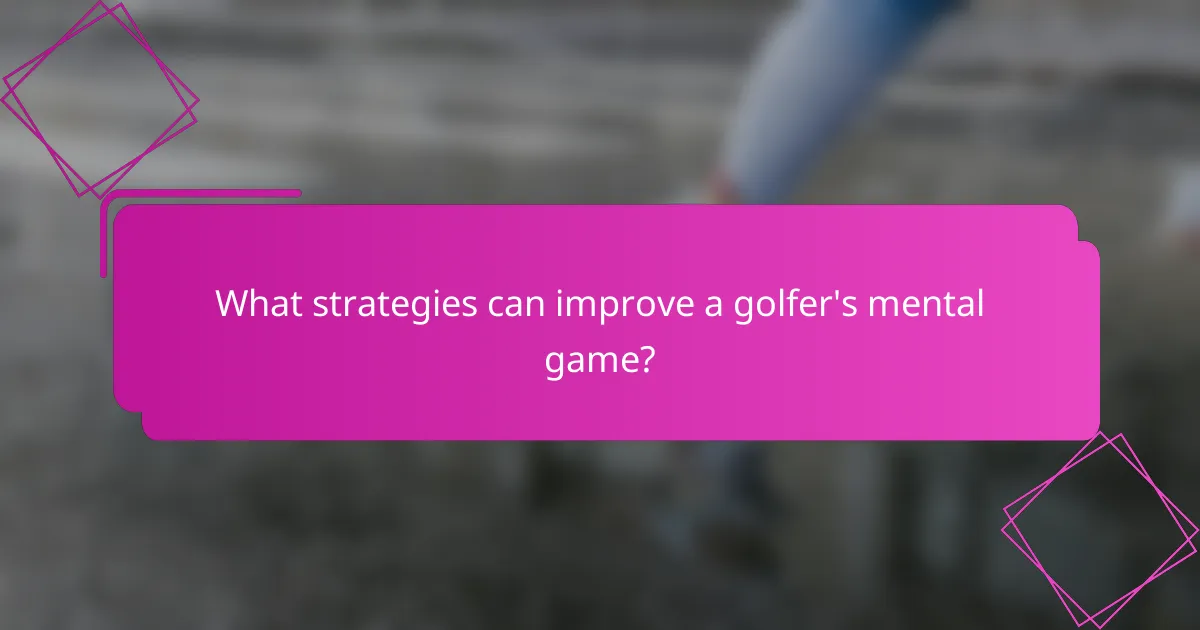
What strategies can improve a golfer’s mental game?
Improving a golfer’s mental game involves strategies like visualization, mindfulness, and routine development. These approaches enhance focus, reduce anxiety, and boost overall performance. Visualization helps golfers mentally rehearse shots, while mindfulness techniques promote present-moment awareness. Establishing a consistent pre-shot routine builds confidence and reduces distractions. Practicing these strategies leads to better decision-making and emotional control during play.
Which visualization techniques are most effective?
Visualization techniques such as mental imagery, visualization of successful shots, and pre-shot routines are highly effective for enhancing the golf mental game. These techniques help players manage anxiety, improve focus, and boost confidence. Mental imagery allows golfers to visualize their swings and shots, reinforcing positive outcomes. Visualization of successful shots prepares the mind for execution, while pre-shot routines create consistency and reduce stress during play. Incorporating these strategies can lead to improved performance on the course.
How can mindfulness practices enhance concentration?
Mindfulness practices enhance concentration by promoting present-moment awareness, reducing distractions, and improving mental clarity. Techniques such as meditation and deep breathing can help golfers focus better during play. Research shows that regular mindfulness practice can lead to increased attention span and better performance under pressure. Additionally, mindfulness fosters a calm mindset, allowing for more strategic decision-making on the course.
What are the benefits of pre-shot routines?
Pre-shot routines enhance focus, consistency, and confidence in golf. They help players manage anxiety, establish a mental framework, and improve performance. A well-defined routine can lead to better shot execution and decision-making. Additionally, it fosters a sense of control over the game, allowing players to maintain composure under pressure.

How do cultural attitudes towards golf impact mental strategies?
Cultural attitudes towards golf significantly influence mental strategies. In cultures that highly value competition, players may adopt aggressive tactics, focusing on performance and winning. Conversely, in cultures emphasizing enjoyment, players might prioritize relaxation and mindfulness, leading to a more balanced mental approach. These differing perspectives shape how golfers develop resilience, confidence, and focus, impacting their overall performance and enjoyment of the game. Understanding these cultural nuances can enhance mental game strategies, allowing players to adapt their approach based on their environment.
What differences exist in mental game approaches across regions?
Mental game approaches in golf vary significantly across regions due to cultural influences and local practices. For example, in North America, mental strategies often emphasize visualization and positive self-talk. In contrast, Asian players may focus on mindfulness and meditation techniques. European golfers frequently integrate sports psychology principles into their training. These regional differences reflect unique attributes of each culture, shaping how players perceive and manage mental challenges in the game.
How does the perception of pressure vary among golfers?
The perception of pressure among golfers varies significantly based on individual mental resilience and experience. Some golfers thrive under pressure, viewing it as a challenge, while others may experience anxiety that hinders performance. Factors influencing this perception include personal mindset, past experiences in high-stakes situations, and mental game strategies employed. For example, golfers who utilize visualization techniques often report a more positive perception of pressure, allowing them to perform better in competitive settings.
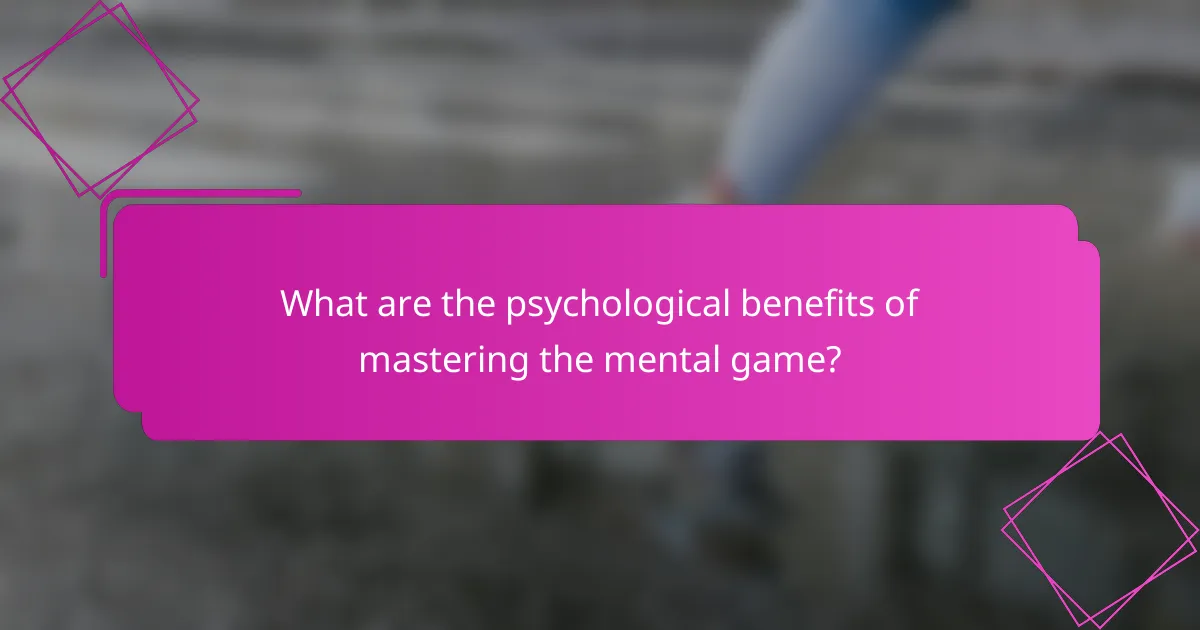
What are the psychological benefits of mastering the mental game?
Mastering the mental game of golf offers significant psychological benefits, including enhanced focus, reduced anxiety, and improved resilience. These benefits help players maintain composure under pressure, leading to better performance. Enhanced concentration allows golfers to stay present, while reduced anxiety fosters a positive mindset. Improved resilience enables players to bounce back from setbacks, ensuring a consistent approach to the game. Overall, mastering the mental game cultivates a strong psychological foundation crucial for success in golf.
How can improved mental skills lead to better scores?
Improved mental skills can significantly enhance golf scores by fostering focus, confidence, and strategic thinking. These skills help golfers manage pressure and maintain composure during play. For instance, visualization techniques can lead to better shot execution, while mindfulness practices improve concentration. Research indicates that athletes with strong mental skills often experience lower performance anxiety, resulting in higher scores. Additionally, consistent mental training can create a competitive edge, allowing players to perform optimally under stress.
What long-term benefits arise from mental training?
Long-term benefits from mental training in golf include improved focus, enhanced emotional control, and increased confidence. These benefits lead to better performance, consistent play, and resilience under pressure. Regular mental training fosters a positive mindset, enabling golfers to overcome challenges and maintain motivation. As a result, players often experience a more enjoyable and fulfilling golfing journey.
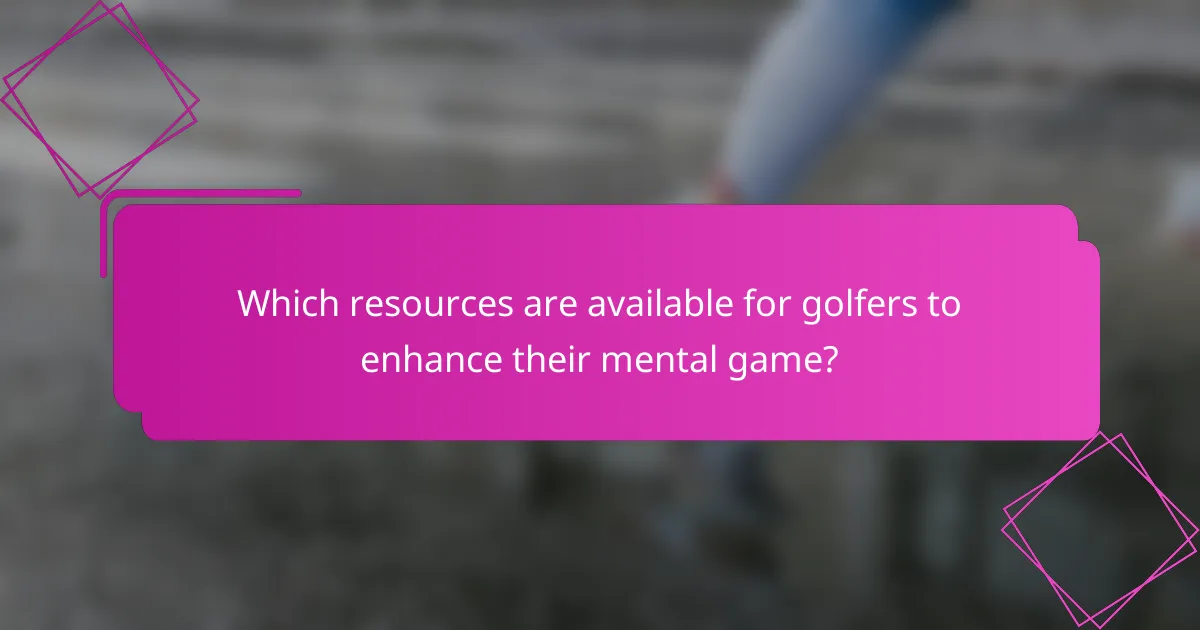
Which resources are available for golfers to enhance their mental game?
Golfers can enhance their mental game through various resources. These include books on sports psychology, online courses, mobile apps for mindfulness, and coaching sessions focused on mental strategies.
Books like “The Mental Game of Golf” provide insights into mental resilience. Online platforms offer courses that teach visualization techniques and focus improvement. Mindfulness apps help golfers manage stress and maintain concentration during play. Coaching sessions can personalize strategies to fit individual needs, ensuring effective mental training.
What books and publications offer insights on golf psychology?
Several books and publications provide valuable insights into golf psychology. Notable titles include “The Mental Game of Golf” by Dr. Karl Morris, which focuses on mental strategies for performance improvement. “Golf is Not a Game of Perfect” by Dr. Bob Rotella emphasizes the importance of mindset in achieving success on the course. Additionally, “The Inner Game of Golf” by W. Timothy Gallwey explores the mental aspects of golf through self-awareness and focus. These resources highlight strategies and techniques to enhance mental resilience and performance in golf.
How can coaching programs aid in developing mental skills?
Coaching programs enhance mental skills in golf by providing structured guidance and strategies. They focus on developing focus, resilience, and confidence, crucial for performance under pressure. Programs often include techniques such as visualization, goal setting, and mindfulness, which help players manage stress and improve concentration. Additionally, personalized feedback from coaches fosters self-awareness, allowing golfers to identify strengths and areas for improvement. As a result, players can apply these mental strategies effectively during competitions, leading to better outcomes.
What online tools and apps support mental training?
Several online tools and apps enhance mental training for golfers. These resources focus on visualization, concentration, and relaxation techniques.
1. Headspace: Offers guided meditations tailored for athletes, improving focus and stress management.
2. Calm: Features mindfulness exercises that help golfers maintain composure during play.
3. Golf Genius: Provides performance tracking while incorporating mental game strategies.
4. Mindset Golf: Focuses on mental resilience and offers exercises to improve mental toughness.
5. Insight Timer: A meditation app with a vast library of resources for enhancing mental clarity.
6. The Golf Psychology Podcast: Delivers insights from experts on mental strategies for golfers.
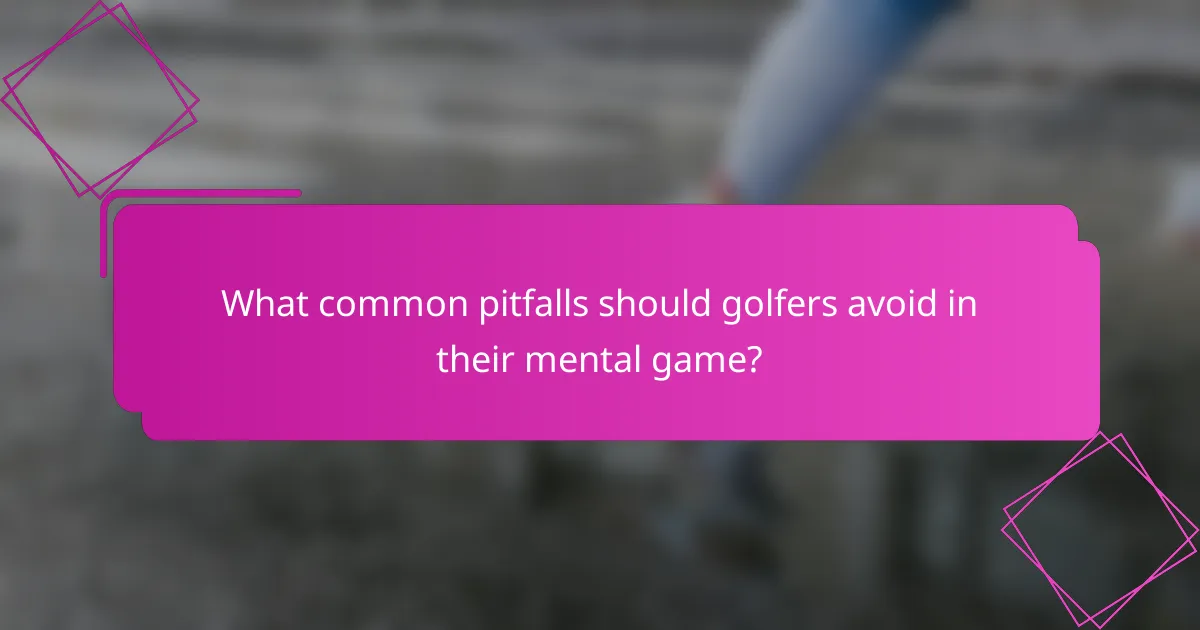
What common pitfalls should golfers avoid in their mental game?
Golfers should avoid overthinking, negative self-talk, and focusing on outcomes rather than processes. These pitfalls can hinder performance and affect confidence. For example, excessive analysis during play can disrupt rhythm. Additionally, maintaining a positive mindset is crucial for resilience. Establishing routines and practicing mindfulness can help mitigate these issues effectively.
How can negative self-talk hinder performance?
Negative self-talk can significantly hinder performance in golf by undermining confidence and focus. It creates a mental barrier, leading to increased anxiety and poor decision-making during play. This self-defeating mindset can result in decreased motivation and a negative feedback loop, where poor performance reinforces negative thoughts. Strategies to counteract negative self-talk include positive affirmations, visualization techniques, and mindfulness practices, which help athletes maintain a constructive mental game.
What are the risks of overthinking during play?
Overthinking during play can lead to decreased performance and increased anxiety. It often results in loss of focus, second-guessing decisions, and excessive self-criticism. These mental barriers can hinder a golfer’s ability to execute shots effectively. Developing strategies to manage thoughts can enhance the mental game and improve overall performance.
How does lack of preparation affect mental readiness?
Lack of preparation significantly undermines mental readiness in golf. It leads to increased anxiety, decreased focus, and poor performance. Prepared golfers exhibit confidence and clarity, essential for executing strategies and overcoming challenges. In contrast, unprepared players may struggle with decision-making and consistency, impacting their overall game.
What expert tips can help optimize the golf mental game?
To optimize the golf mental game, focus on visualization, mindfulness, and routine. These strategies enhance concentration and reduce anxiety during play.
Visualization involves mentally rehearsing shots to build confidence and clarity. Mindfulness practices help players stay present, minimizing distractions and negative thoughts. Establishing a consistent pre-shot routine fosters comfort and focus, allowing for better performance under pressure.
Incorporating these techniques can significantly improve your mental approach to the game, leading to more consistent results on the course.
